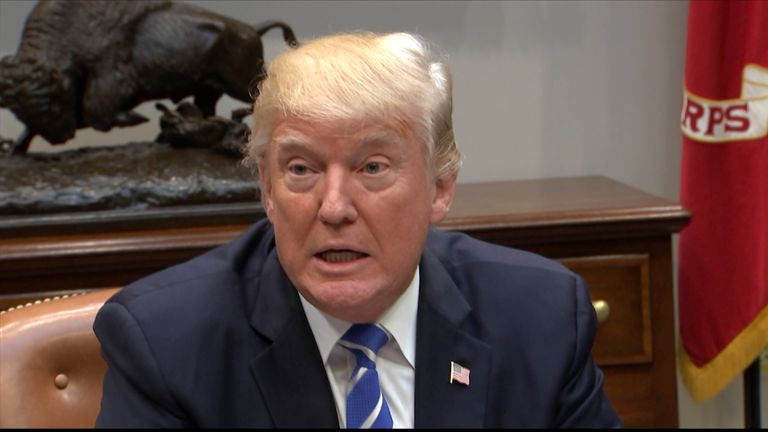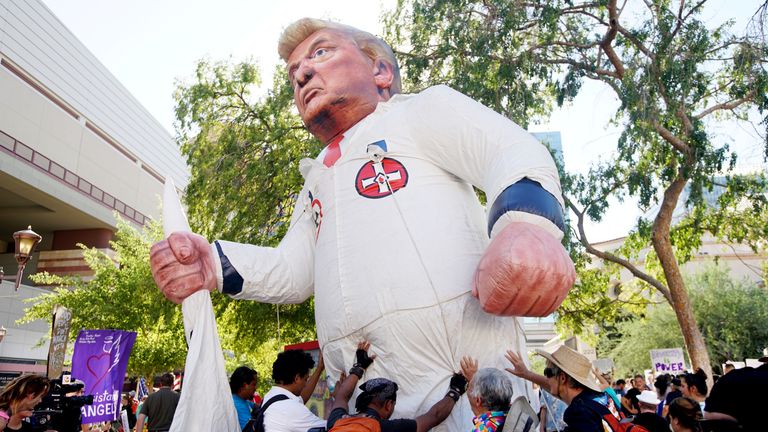Long read: Trump's three things to smile about

Saturday 9 December 2017 15:21, UK
Cordelia Lynch, US Correspondent
It has been a whirlwind year in Washington, with a volley of twists and turns that upended the norms and changed the course of American political history - a mercurial odyssey that is impossible to predict. The pace is rapid.
An average day covering Trump's America can feel like you've started with breakfast on the big dipper, been thrown onto the Ferris wheel by lunchtime and thrust onto the trapeze by dinner.
There have been plenty of bumps and surprises along the way, with the establishment weighing up how and if it can stay on board. But the last 10 days have felt different. The President managed to deliver some major political prizes for his base after a few tricky months to navigate.
Yes, there is a Russia probe that's now reached the White House, the President's retweets of far-right anti-Muslim videos and his support for an alleged paedophile. But to Trump followers and millions of Americans, some of that is at best noise to avoid and at worst, lies. They want to focus on the gifts they've been given and there are arguably more to put under the Christmas tree from the past week, than they've had all year.
First, the House passed a sweeping tax overhaul - taking Mr Trump a step closer to his first major legislative victory. Granted, it will help billionaires more than it will bolster low-paid America, but they should get some reward. Wall Street promises that by slashing the corporation tax rate, the money will trickle down to Main Street, through greater investment that will create jobs and higher wages. The prospects for blue-collar America do appear to be looking up, too. Unemployment is very low and some employers are being forced to push up pay to plug a shortage in labour in certain sectors. Wall Street is looking and sounding buoyant too, with a run on the stock market and shares performing well. That started before Mr Trump walked into 1600 Pennsylvania Avenue of course and shares can change course quickly.
But Donald Trump knows how to toot the horn and he'll have his megaphone ready whenever there is a positive sign to attach himself to. It was very messy at times, with Democrats complaining about unreadable handwritten last-minute amendments, but both sides have been guilty of that in the past and this was a high stakes bill. In the long-term it matters because Republicans hope a booming economy will give them a chance to campaign on tax policy in the midterms next November. Congress has at times felt like an insurmountable roadblock but in the end, it was tax cuts beloved that brought them together. If the plan gets through the Senate, there could be more victories down the road.
Just three days later, President Trump scored another win, if not an absolute one yet. The Supreme Court ruled his controversial travel ban on six Muslim majority countries could be enforced. Seven of the nine justices lifted injunctions imposed by lower courts against a policy which sparked global outrage from the offset. It's not over yet. There are still legal challenges being heard in federal appeals courts in San Francisco, California, and Richmond, Virginia. Travel ban 3.0 will end up back at the Supreme Court and the final decision could be months or years away. But, legal analysts say Monday's decision suggests America's top judicial body may ultimately rule in favour of the administration. That is quite something that was met with such global condemnation.
If all those developments weren't enough to wade through, 48 hours later, the Trump administration decided to and to move the US embassy from Tel Aviv to Jerusalem. The President cast it as a bold break with decades of foreign policy; his critics denounced it as reckless and self-defeating. But it was a political not a diplomatic decision. Mr Trump clearly believes the benefits outweigh the costs and his wealthy Zionist donors and Evangelical backers, swiftly rejoiced at the news.
The Republican Jewish Committee bought a full-page ad in the New York Times, which read, "President Trump. You Promised. You Delivered". Next to the words was an image of Mr Trump, wearing a black kippah, placing his hand on the Western Wall in Jerusalem during a visit in May. It was the culmination of a concerted outreach by the President who as a candidate told America's largest pro-Israel group, AIPAC, that he was "a true friend of Israel". Now he had given them the prize they had always wanted.
The move was roundly condemned by foreign leaders and the UN, and inevitable protests followed. No one knows what may follow. But let's not forget Mr Trump's predecessors had also promised to relocate the embassy - from Bill Clinton to George H W Bush. By following through, he could portray himself as the man who gets things done and claim another notch on his belt. He seemed to relish the role of political insurgent, railing against orthodoxy on behalf of those who put him in office. It was move rich in symbolism. Senior administration officials I spoke to said it was a "recognition of reality….not a prejudgement or gift", with no decisions about boundaries embedded in it. His advisers described it to me as a way of "augmenting confidence in his leadership", trying to hammer home that this was a leader who promised he wouldn't slavishly follow the status quo.
It does of course come with a great deal of risk. The Palestinians labelled it "the kiss of death" to a two-state solution, despite the administration's insistence they remained committed to that if both sides agreed on it. Many in the international community argue, compromises America's role as honest broker and will be disastrous for the region. But we should not be surprised by it. As we've seen with the Iran deal and Paris accord, Mr Trump wants to break with convention and the more liberals leap up and down screaming about that, the more his base loves him.
Around the corner, Mr Trump is hoping the controversial candidate Roy Moore, who's accused of sexual misconduct with teenage girls, can chalk up something else for his Evangelical supporters to celebrate. After getting his fingers burned by backing the establishment-endorsed candidate in the Alabama Senate primary, the President recently urged voters to get behind Mr Moore. The Republican National Committee soon followed, and with money. Days later, he's ahead in the polls.
The race has been characterised as a referendum on the Republican party leadership in Washington, the credibility of the media and what the country is prepared to tolerate. Mr Trump has portrayed it something far more simple - a vote on the policies he knows the Christian right in Alabama care deeply about: crime; illegal immigration; abortion; and the military. Mr Moore's supporters share some of his hard-line views, however unpalatable for Congress and many doubt the allegations of his accusers.
Political partisanship runs deep in the state and the conservative electorate shows no sign of deserting him. What has been extraordinary to watch is the Republicans begrudgingly falling into line despite refusing to do so at the start. The GOP face a moral and ethical conundrum and this could decide their ultimate fate. The power dynamics of that "shining city upon the hill" that Ronald Reagan described, are shifting dramatically.
If Mr Moore wins, it could be an albatross around the necks of the establishment. There are members who want his case to be seen by the Senate Ethics Committee and they balk at the idea of his views being aired in their sacred halls. But there is a harsh political reality - the public may want him and the party need him in a Senate where they now hold only a two-vote majority.
Next week, Alabama will be the obsession. By the end of the week, maybe the Russia investigation will rear its head again. Who can possibly say? But in the White House, I doubt it's getting much more than a shrug of the shoulders and a few frustrated sights. They're eyeing up another chance to demonstrate they are winning. The guilty plea from Michael Flynn, the president's former National Security Adviser, may have taken the Robert Mueller probe to the Oval Office, but the White House seems to think it'll be over by the new year.
Two people I've spoken to who have been interviewed by Robert Mueller, say the same privately. The fact General Flynn is co-operating with the special counsel doesn't necessarily mean Mr Trump is in personal legal jeopardy, much less on the road to impeachment. The atmosphere of hysteria is dangerous and people have got stories wrong - that chips away at public confidence. Obstruction of justice is easier to prove than collusion though and the President could probably do with laying off the tweets. Every single one he shares (whoever is writing them) could be used to arm his opponents and fill the evidence files of the methodical Mr Mueller.
But the story pendulum swings quickly in Washington. Tens days after a bombshell revelation from his former adviser, Donald Trump now has three big things to smile about and another possible cause for optimism on the way. He may have scored some inelegant wins and appalled his counterparts, but after a few turbulent months, he has points on the board. For him, that's what matters.






